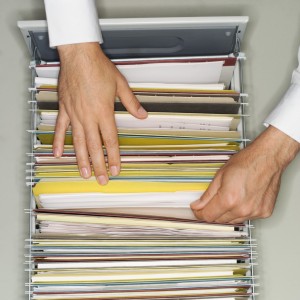How many times have you gone to pay a bill, only to discover that you missed an early payment discount option? Or needed paperwork to give to your accountant or banker, and even though you know for a fact it passed your hands recently, you can’t find it to save your life?
The sad truth is that many of us don’t have our paperwork in order. Some of us don’t keep a single receipt, while others of us keep every single scrap of paper we come across. If you’ve ever been looking through your files only to realize that your financial records are unorganized or incomplete, you’ll know the feeling of despair and frustration. And this affects your business and your bookkeeping as well.
Here are a few ways you can get more organized in your filing so that your business benefits:
Create a filing system.
If you have one already, that’s great, but if not, just get some files and get started. Consider buying:
- Colorful binders
- A box or container with hanging files
- Tabs to organize these files and binders
- Long thin boxes that fit under desks, bookcases, even beds
You could probably just go to your nearest OfficeMax or supply store and just have at it.
Remember, you want to have your current files handy and close, and the ones that you aren’t using right now can be stored away.
What kind of financial records should you keep?
When it comes to financial records, there are certain things you need to have sorted very carefully. Let’s break it down a bit.
Taxes: You need a file for this year’s tax return information. You also want to keep track of any W-2 or 1099 forms, and income records. Keep your receipts and your cancelled checks, and make sure you have documentation for any deductions you plan to take.
Bank Statements: Keep all your statements, and separate them per account. Be sure that any other documentation you receive from your bank, especially your cancelled checks, is kept neatly filed away.
Investment Accounts: This is pretty simple: Save everything. All your paperwork is essential for tax savings! You should have documentation of the purchase of the investment, its sale, and any other activity that happened on the account.
Retirement Accounts: Regardless of whether or these are employer sponsored plans or not, you ought to have these filed per account. Any IRA, 401-K, or other pension or retirement plan will have enrollment papers, statements, beneficiary designations, and contact information. Keep these things handy.
Insurance Policies: Each insurance policy needs its own file. In the file there should be a policy number, the issuing company name, the agent’s name, who is covered on the policy, and any beneficiaries.
Health Care Receipts: These will typically fall into two categories. First, you should have receipts from any health payments you made personally, with either a Health Savings Account (HSA) or a Flexible Savings Account (FSA). Second, you should have the insurance company’s Explanation of Benefits (EOB). These are all essential to keep.
Home-Related Paperwork: There could be a lot that you might file under “home-related paperwork”, so we’ll make it pretty straightforward. This file should have any documents related to the home’s purchase, sales agreements, and closing documents. It should also have records of replacement costs, an inventory of the stuff you own in the house, and any home improvement paperwork.
If you’re making progress with all those categories, then you’re well on your way to organized!
Special Documents That Aren’t Used As Often
We’d also like to advise you on special documents that aren’t needed often but that are extremely important. Consider keeping them in a safe deposit box. These include:
- Birth certificates
- Marriage certificates
- Adoption papers
- Divorce papers
- A signed original will
- Citizenship documentation, if you were not born in the USA
- Deed to your house
- Titles for your cars
Electronic Filing
Of course, with all the electronic filing opportunities, you’ll want to have an electronic filing system that mirrors your paper filing!
Finishing Touches
To make the entire collection of records easy for you to manage (or easy for a family member to manage, if you need their help or you pass away), create an overview document. Put together a list of your assets and a record of your debts. Have a little catalog of all your important documents. And, finally, a list of all the financial advisors, attorneys, CPAs, and anyone else essential to managing your finances, and include their contact information.
Now, keep your filing under control
Okay, you’ve done it! You took control and now you’re organized. Now you just have the task of keeping it under control. The easiest way to do this is to carve out a few minutes each week to file any papers that arrived that week. Then, once a year, just do an overhaul. Put away last year’s documents, start fresh files for this year, and move on! If you give yourself a few minutes each week, the overhaul won’t be a big deal. Keep this in mind: Clutter is the enemy. If you wait till you have a huge pile of paperwork to deal with, you’ll never get it done. But if you just clean up at the end or at the beginning of the week, you won’t be intimidated by this, you’ll be in control of it.
